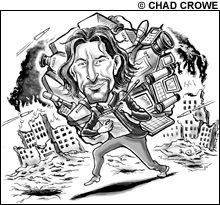 Everyone’s heard of garage rock. But it took Kevin Sites to discover bedroom rock — in which an Iranian heavy-metal band called Mine practice in a member’s bedroom at a time when an increasingly worrisome, belligerent, and radical Iranian government has outlawed the performance of Western music.
Everyone’s heard of garage rock. But it took Kevin Sites to discover bedroom rock — in which an Iranian heavy-metal band called Mine practice in a member’s bedroom at a time when an increasingly worrisome, belligerent, and radical Iranian government has outlawed the performance of Western music.
How did Sites, the veteran war journalist hired by Yahoo! to spend a year covering every major global hot spot, get his camera inside that clandestine jam session? His local “fixer” knew the lead singer’s father and a deal was consummated.
“The parents were really progressive, very liberal,” says Sites.
Until now, the 42-year-old Sites — who has worked at CNN, ABC, and NBC — was best known for igniting a major controversy in 2004 when, while working for NBC News, his camera captured a US Marine shooting a wounded Iraqi in a mosque in Fallujah. “I’m very comfortable with my actions there,” he asserts today.
In his new role, traversing the globe as a solo journalist equipped with his wits and a tech tool bag that includes camcorders, a digital camera, a laptop, a satellite modem, and satellite phones, Sites regularly files stories, photos, and video clips at hotzone.yahoo.com from inside international trouble spots such as Iran, Lebanon, Iraq, the Sudan, Uganda, the Congo, and Somalia.
“We’re covering all these places that we feel the mainstream media frankly aren’t looking at,” says Robert Padavick, Sites’s senior producer at Yahoo!. More important, Sites focuses not so much on politics and policy as on the day-to-day lives of the people.
His reporting from Iran featured young musicians and kids playing street hoops, as well as the scourge of drug use and AIDS infection inside the Islamic theocracy. From the war-ravaged Sudan he chronicled how a new health center helped save the life of a two-year-old boy. In Kurdish-controlled northern Iraq, he described how relative tranquility has inspired big economic dreams, leading not only to wealth but also to inflation and corruption. A furniture-store owner there complained that police work provides so many well-paying jobs that he can’t find employees anymore.
“That’s our mandate, the whole idea behind this,” Sites says in an interview from Amman, Jordan, a city he had just returned to after a week in Syria. “I’m not a wire service. What I really want to do is put a human face on all these conflicts ... Every conflict is not a conflict for me. It’s a human being ... The idea is you tell the small stories [and] people start to get the bigger picture.”
Despite his ability to get the human stories behind the lines, Sites says “it’s really not always easy. It seldom is.” He has reason to suspect his phone was tapped in Iran and while talking to a group of young people in a Syrian tea shop, the man at the next table was so obviously monitoring the chat that Sites assumes he was being officially watched. Cognizant of anti-US sentiment, he carries both American and Irish passports, but admits, “I don’t blend in. Unfortunately, I’m a tall Western-looking guy with long hair.”
One of the features of Sites’s online reporting is the reader and viewer feedback posted on the site. (Padavick says he sees the venture “as sort of the bridge between the mainstream media and the blogosphere.”) A response to his Iranian coverage lectured Sites that his “trip in Iran was like a blind man with no knowledge.” For his part, the correspondent readily acknowledges that the biggest problem he faces is “the very steep learning curve” required in many of the countries he visits. “You do make errors and you omit things,” he says. “We want to be transparent.”
Sites says that his Yahoo! tour of duty has shaken his own perceptions about the world. “Before I came on this thing, I thought I’d seen everything,” he says. “I haven’t. I’m definitely humbled by the expression of people being able to overcome their suffering.”
It helps that he sustains a journalist’s open mind. “I don’t have a political agenda. I do have an agenda to let people see what I’m seeing,” he says. “If you get that privilege and you don’t share that privilege, you’re an asshole.”
Anchor duet at ABC
 While most of us are still burning the early-evening oil at work or watching Everybody Loves Raymond reruns, that creakiest of big-media dinosaurs — the nightly network news broadcast — is changing dramatically right under our noses.
While most of us are still burning the early-evening oil at work or watching Everybody Loves Raymond reruns, that creakiest of big-media dinosaurs — the nightly network news broadcast — is changing dramatically right under our noses.